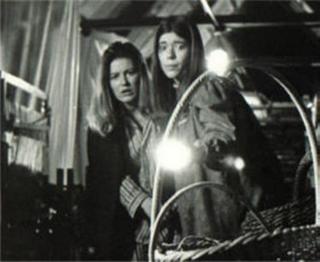 YOU'LL LIKE MY MOTHER (1972)
YOU'LL LIKE MY MOTHER (1972)Dir: Lamont Johnson
Fans of the sub-sub genre known as Winter Horror will relish this tale set in a creepy old mansion in the desolate northern reaches of Minnesota. Indeed the snowbound landscapes lend a suitable air to a story of a young widow visiting her mother-in-law and receiving a most chilly reception. Patty Duke is the young mother-to-be, calling on her dead husband's family for the first time just prior to giving birth. Rather than being welcomed into the fold, she is subjected to verbal and physical abuse by the imposing mother, and shocked by a highly dysfunctional household of a sweet but mentally challenged sister and a psychotic rapist (creepily played by Richard Thomas just a couple of years before he disappeared forever as an actor into the role of JohnBoy Walton).
Based on Naomi A. Hintze's novel of the same name, the clearest inspiration for the story seems to be the enormously similar Die! Die! My Darling (1965 Dir: Freddie Francis), in which Stephanie Powers plays the beleagured heroine to monsterous mom-in-law Tallulah Bankhead (who really stretched herself in the role of teetotaler, Bible-thumping zealot). Lamont johnson's film updates the scenario to have a timely relevance that still resounds with topical cultural references: Duke dresses in quasi-hippie garb throughout; her husband has been killed in the Vietnam War; bus drivers spout peacenik slogans; Thomas is an obvious draft dodger (in addition to being a sex criminal); psychoactive drugs are imployed to keep Duke a docile prisoner and even the evil Mother represents an archetypal Oppressive Authority Figure.
An impressive level of suspense and dread is maintained throughout You'll Like My Mother, with a downbeat mood typical of the decade. It would be hard to imagine a contemporary MTVM so persistently grim and imposing. Patty Duke is excellent in the lead, and far more subdued than her generally histrionic self, while Sian Barbara Allen is a standout as the disturbed sister-in-law. Rosemary Murphy's performance anchors the film however, as she imbues her villanous character with both cruelty and a sad weariness. Two scenes in which she comforts her sex offender son, hidden in a basement room, are touchingly perverse, her icy demeanour giving way to a mother consumed with guilt and maternal love.

0 Comments:
Post a Comment
<< Home